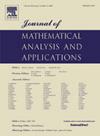Boundedness criteria for a chemotaxis consumption model with gradient nonlinearities
IF 1.2
3区 数学
Q1 MATHEMATICS
Journal of Mathematical Analysis and Applications
Pub Date : 2025-01-09
DOI:10.1016/j.jmaa.2025.129226
引用次数: 0
Abstract
This work deals with the consumption chemotaxis problem in a bounded and smooth domain , , under homogeneous Neumann boundary conditions, for , and for positive initial data with a certain regularity. We will show that the problem has a unique and uniformly bounded classical solution for . Moreover, we have the same result for and a condition that involves the parameters and the initial data.
求助全文
约1分钟内获得全文
求助全文
来源期刊
CiteScore
2.50
自引率
7.70%
发文量
790
审稿时长
6 months
期刊介绍:
The Journal of Mathematical Analysis and Applications presents papers that treat mathematical analysis and its numerous applications. The journal emphasizes articles devoted to the mathematical treatment of questions arising in physics, chemistry, biology, and engineering, particularly those that stress analytical aspects and novel problems and their solutions.
Papers are sought which employ one or more of the following areas of classical analysis:
• Analytic number theory
• Functional analysis and operator theory
• Real and harmonic analysis
• Complex analysis
• Numerical analysis
• Applied mathematics
• Partial differential equations
• Dynamical systems
• Control and Optimization
• Probability
• Mathematical biology
• Combinatorics
• Mathematical physics.

 求助内容:
求助内容: 应助结果提醒方式:
应助结果提醒方式:


